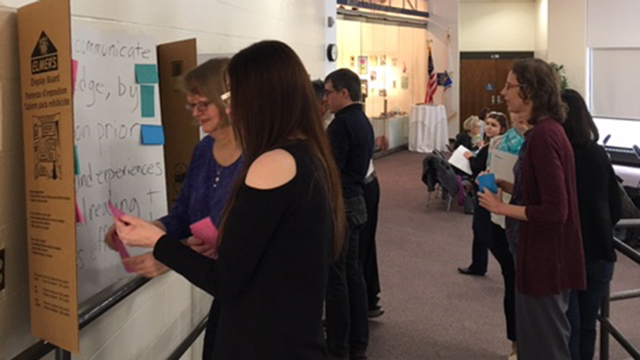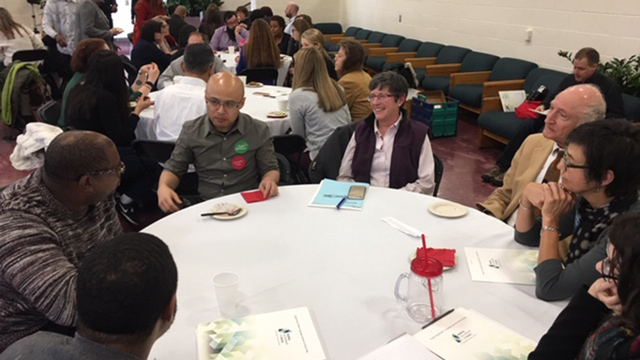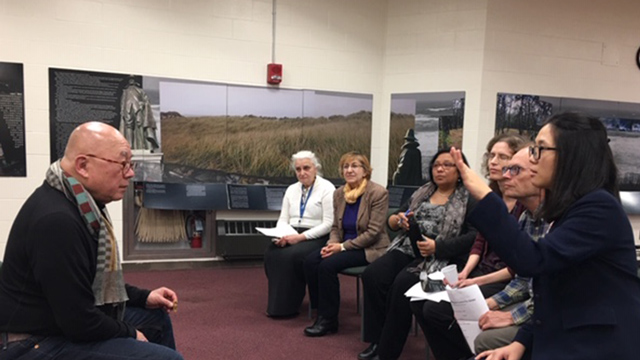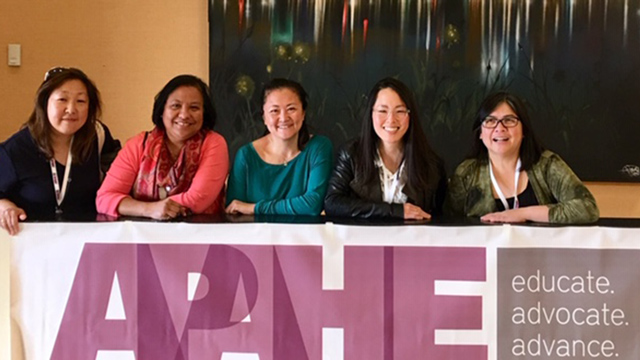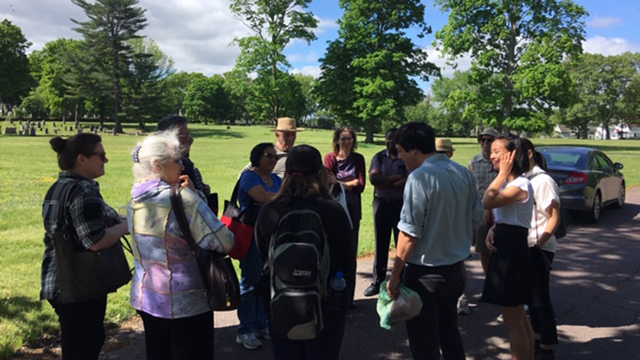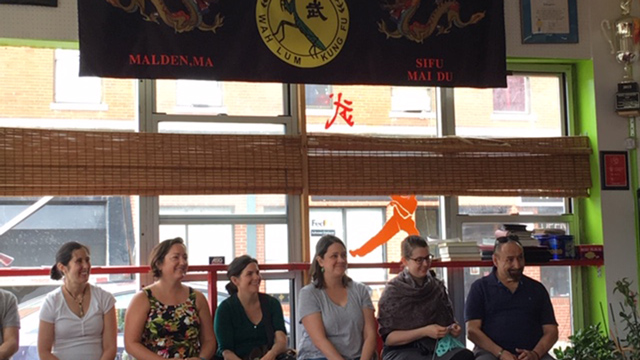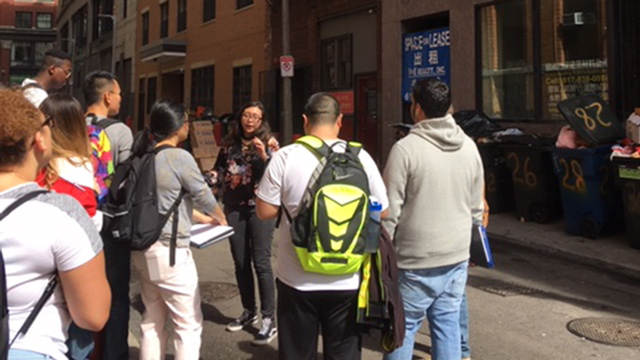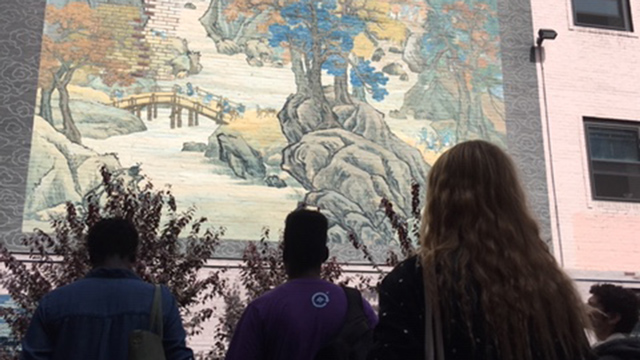
Building the Framework for Success Year 2 Accomplishments
View more event photos in our Flickr gallery.
Year II Accomplishments
October 1, 2017 - September 30, 2018
Significant Highlights
In Year II, the AANAPISI grant teams designed and implemented an accelerated ESL course sequence with an integrated success coaching model that is showing early promise in increasing student success. Together with new courses that integrated Asian American content, the piloted courses served more students, broadened college-wide engagement, and promoted more reciprocal partnerships with local Asian American community organizations.
The ESL Design Team:
- Designed and piloted 7 ESL integrated skills courses that served a total of 142 students, while simultaneously engaging with other faculty in the ESL-English alignment work to continue the differentiated acceleration of ESL students into college-level English courses. Both activities increased the percentage of first-time enrolled ESL students who progressed into ENG 111 within two semesters from 42% in Year I to 48% in Year II, and the percentage of those who successfully completed ENG 111 within three semesters from 37% in Year I to 41% in Year II.
- Used the knowledge they gained from researching best practices in ESL pedagogy to lead two college-wide Professional Development (PD) days in AY 2017-2018 that focused on asset-based approaches to supporting English Language Learner (ELL) students. There was broad engagement in both of these PD days by faculty, staff, students and administrators (221 participants in fall 2017 and 179 in spring 2018). Scholars from the local community served as resource speakers, thus further strengthening our community partnerships. The success of both events was a collaborative effort between the AANAPISI team and multiple campus units: the College’s internal governance; Integrated Marketing and Communications (IMC); and the Office of College Events and Cultural Planning, which covered the logistical expenses for both events.
- Modified the math placement procedure for ELL students. In December 2017, the Provost approved a joint recommendation by the AANAPISI Project Director and Dean of Humanities and Learning Communities allowing all students currently enrolled in ESL Level I to take the math placement test vs. the past practice that required students to successfully complete ESL Level II before they could take the test.
- Collaborated with the Language Lab to explore how the pedagogical approach of the pilot ESL courses can be integrated with language lab services. This collaboration partly accounted for 209 class and 3,877 student visits to the Language Lab in Year II, up by 92% and 86%, respectively, from Year I levels.
- Engaged ESL faculty in developing program and course learning outcomes across all three levels of ESL courses. Concurrently, the Language Lab developed and aligned its outcomes with the new ESL outcomes, resulting in a more seamless, integrated delivery of language support services.
The Targeted Success Coaching Team:
- Developed advising protocols to ensure proper placement of ELL students into the ESL integrated course pilots, and trained all LifeMap student advisors on how to use them.
- Piloted a success coaching model that served all 142 students enrolled in the spring 2018 ESL integrated pilots. The model consisted of five in-classroom visits during the semester that helped students feel more connected with the AAPI success coach and with available resources in the College.
- Collaborated with the Office of Learning Communities to train 7 student mentors who assisted the AAPI success coach in providing peer support to students enrolled in the ESL integrated skills courses.
- Organized community events for AAPI students to elicit their needs and suggestions on programming events. A total of 23 students attended these events, 13 in fall 2017 and 10 in fall 2018.
The Local-Global Learning Team:
- Designed and piloted 16 course sections that integrated Asian American content in the curriculum and served a total of 351 students. These included courses piloted by 11 faculty fellows who actively participated in the second AANAPISI Local-Global Learning Institute held in summer 2018.
- Collaborated with multiple offices on campus to deepen the community’s understanding of AAPI issues, among them: (1) the Office of Diversity and Inclusion, which funded the talk of Jose Antonio Vargas on immigrants in the US for its Difficult Dialogues Series. The team sponsored a pre-visit film viewing of “Un-Documented,” a post-talk reflection session, and a classroom visit by the guest speaker on the day of the talk. The event drew participation from over 200 members of the College community; (2) the Office of College Events and Cultural Planning, which launched an art exhibit by Chinese American artist Wen-ti Tsen. As co-sponsor of the exhibit, the AANAPISI team enabled the artist to interact with almost 70 students from 3 Asian American-themed courses and conduct a workshop with about 20 faculty and staff.
- Collaborated with the College’s major cultural institutes in obtaining a $100,000 state-funded grant to establish the Center for Equity and Cultural Wealth (CECW) and launch the College’s first Equity Institute in summer 2018 with the theme, “Dismantling Power and Privilege in Higher Education.” The Institute positively impacted grant activities. It raised greater awareness about AAPI equity issues and strengthened partnerships with local AAPI scholars, artists, and student service professionals who served as workshop speakers, opening artist keynotes, and field experts. A total of 29 faculty, staff and administrators engaged in the AAPI-themed workshops, and 21 participants engaged in a field-based study led by UMass Boston scholars. In addition, the Institute became the venue for announcing the College’s One Book Selection for AY 2018-2019, “The Years of Zero: Coming of Age Under the Khmer Rouge” by author Seng Ty – and the collaboration between the AANAPISI leadership and the One Book Program in designing programming events leading up to the author’s visit in April 2019.
- Strengthened existing local community partnerships by supporting the participation of 17 faculty and staff in the Boston Asian American Film Festival; and promoting a more reciprocal relationship with the Asian American Civic Association (AACA) through organized, interactive class visits. In summer 2018, 15 AACA students visited a BHCC class in Psychology and talked about the mission and objectives of the AACA,while BHCC students shared strategies that make for a successful college experience.
- Through these activities, the AANAPISI grant continued to strengthen the capacity of Bunker Hill Community College to serve students of color who are Pell-eligible, most especially our AAPI students.
Key Contributions
In Year II, the grant made significant contributions at the College in two broad areas: (1) increasing college-wide awareness on the importance of practicing asset-based approaches to support ELL students; (2) developing more culturally responsive pedagogies that focus on the infusion of AAPI issues into the curriculum.
Asset-based Approaches to Supporting ELL Students
In this area, the grant has made three major contributions. First, leading the College in two PD days that focused on asset-based approaches to supporting ELL students has created more awareness of the need to overcome deficit-based attitudes and institutional practices that negatively impact this group. Data on the successful progression of ESL students to college-level English are providing evidence that asset- based approaches positively impact the success of all students, and most especially the success of AAPI ESL students who are also Pell-eligible. This has increased the momentum for more collaborative efforts between the ESL and English Departments to take the next steps of: aligning the highest level of academic ESL with college-level English; and finalizing the revamp of the entire ESL curriculum by bringing the ESL integrated skills courses to full-scale. Discussions in the ESL Department to consider bringing program and/or course modification proposals to the College’s internal governance (via the Curriculum Committee) in order to institutionalize ESL curriculum reform have also begun and its progress will be evaluated in the APR for Year III.
Second, coordinated efforts among the ESL faculty, the multipurpose language lab staff, the AAPI success coach, and the ACE peer mentors have led to more integrated wraparound student support services for ESL students. These have contributed to a significant increase in the number of instructional technology-related student visits to the language lab by 86%, from 2,079 in Year I to 3, 877 in Year II; and possibly an increase in the retention rates of AAPI ESL students from 67% in Year I to 71% in Year II as well as of AAPI ESL students who are also Pell-eligible, from 72% in Year I to 77% in Year II.
Third, the ESL Design Team’s efforts contributed to an important procedural modification in granting earlier eligibility to ELL students who take the math placement test. In previous years, all ELL students had to demonstrate successful completion of Academic ESL Level II (i.e., a final grade of C and higher) in order to be eligible to take the math placement exam. This created significant barriers to the ability of ELL students to earn college-level credits in math and complete their degrees on time, even when past data showed that many of them placed into advanced math once they were allowed to take the math placement test. To eliminate this barrier, ESL faculty proposed that students currently enrolled in Academic ESL Level I be allowed to take the math placement test, a proposal which was supported unanimously by the Math Department. This prompted the AANAPISI Project Director and the Dean of Humanities and Learning Communities to make a joint recommendation to the Provost regarding this procedural modification, which was approved for immediate implementation in December 2017.
Infusion of AAPI Content into the Curriculum
The activities of the Local-Global Learning Team contributed significantly to supporting the growth of culturally responsive pedagogical practices among BHCC faculty that focus especially on infusing AAPI issues into course curricula. While the presence of other cultural institutes at the College (e.g., the Latino Success Initiative and the partnership with Boston’s Museum of African American History) also continue to encourage infusion of culturally relevant content into courses, the AANAPISI grant has provided the opportunity to: scale the number of courses infused with Asian American content and use culturally responsive pedagogies such as field-based studies; incorporate cultural competence into course learning outcomes; and develop a systematic way of assessing cultural competence that students learn in the course. Five faculty fellows from the first cohort in fact created a rubric on cultural competence, and are poised to use this rubric in Year III to assess cultural competence across courses infused with Asian American content. Finally, the infusion of Asian American content into course curricula also supported and advanced the goals of the state-funded PIF grant to further promote equity and inclusion at our College by establishing the Center for Equity and Cultural Wealth (CECW). The activities of the AANAPISI Local-Global Learning Team constitute a model under study by the Center and the other cultural institutes on how to design, pilot, assess and scale culturally relevant curricula; and support faculty growth through professional development in this area. We are continuing to track the impact of these activities with the goal of disseminating them to the greater public through the Center for Equity and Cultural Wealth's Equity Institute starting in Years IV and V of the grant.


